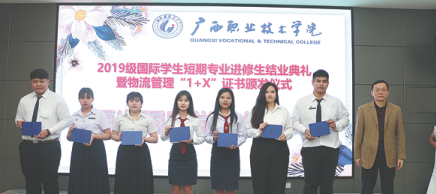Courses to better integrate into BRI

Students from the Guangxi Vocational and Technical College enjoy their commencement day. CHINA DAILY
Colleges in the Guangxi Zhuang autonomous region have been launching training programs in countries involved in the Belt and Road Initiative for almost a decade in order to facilitate better integration and understanding.
The Guangxi International Business Vocational College, which has hosted foreign aid training for the Ministry of Commerce, has held 20 sessions since 2012. The themes have included port logistics, the sugar industry, agriculture, ecological resource development, public management and tourism development.
The college has trained 345 people including governmental officials, administrative staff and technicians from 27 countries, such as Malaysia and Vietnam.
It has also launched training projects focusing on Chinese language for the Association of Southeast Asian Nations to further enhance exchanges in vocational education, and to serve Guangxi's development and the BRI.
Nearly 300 students from 29 countries have received Chinese language training from the college since March 2017.
The college's logistics management major became one of the first national pilot majors for "one plus X certificates" in June 2019. The "one" is the academic certificate while "the X" refers to several vocational skill certificates.
It has organized four logistics training projects aimed at Southeast Asia, including a port logistics development and cooperation training class, since 2014. Students involved listened to lessons given by experts, visited sea ports and learned about traditional Chinese culture.
The college has also implemented BRI-related plans. It organized a cross-border e-commerce teaching group to offer weeklong training courses on e-commerce at a university in Thailand in November 2019. The move helped institutions from the two countries share educational resources and promoted vocational education.
A cross-border e-commerce training class focusing on ASEAN was held at the college from Nov 11, 2019 to Jan 6, 2020. A total of 30 students from five countries, including Thailand and Laos, were enrolled at the class.
The Beihai campus of Guilin University of Electronic Technology, set up an ASEAN education center in 2017 and 65 students from Indonesia and Cambodia have been enrolled.
It welcomed another 26 students from Indonesia in September 2019. Totally, 26 had finished all courses of the training plan and received graduation certificates by the end of June 2020.
Some of the graduates who can speak Chinese fluently became translators and interpreters while several others chose to continue their studies for a bachelor's degree, according to the center. There are also graduates who got technical jobs related to their majors.
The center said the overseas students not only learned specialized knowledge but also participated in many traditional cultural activities. They took part in the opening ceremony of the Beihai campus, made dumplings with their teachers and learned how to do tai chi.
The Guangxi Vocational and Technical College held a closing ceremony for its international students who finished their short-term studies at the school on Jan 13, 2020.
An international promotion center for "one plus X certificates "for logistics management was also launched at the college on the same day.
Soros Plengplang, a 19-year-old student from Thailand, received a vocational skill level certificate in logistics management. She said at the ceremony that she likes the college's teaching model as it provides opportunities to train practical skills. She has worked in the Thailand branches of a steel company from Nanjing in East China and a tire company from Qingdao. She won a scholarship offered by the Guangxi government and became an international student at the college again in September this year.
The "one plus X certificates" system has become a channel to better train technical professionals, said a representative from the college.
The college has actively integrated itself into BRI in recent years. It has used college resources from China and Thailand and established mutual learning platforms for teachers and students to promote higher vocational education exchanges and cooperation between the two countries.
